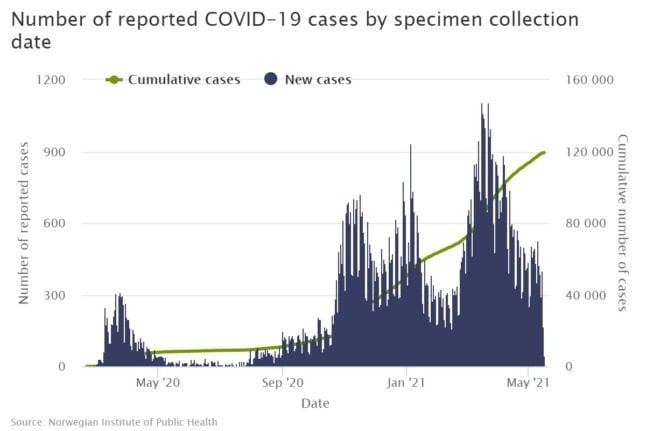Norway expects 4.5 million Covid-19 vaccine doses this summer
The Norwegian Institute of Public Health (NIPH) has dismissed fears that the vaccination program will still be ongoing through the autumn and winter.
The NIPH believes it will receive more than enough doses from vaccine manufacturers Pfizer and Moderna to offer everyone over 18 a vaccine by the end of July.
“We plan to receive 4.5 million doses of the Pfizer and Moderna vaccines in June, July and August. By the end of May, we will be receiving around 340,000 doses a week,” chief doctor at the NIPH Preben Aavitsland told news agency NTB.
Read More: Norway officially axes AstraZeneca vaccine and changes vaccine strategy
More than 1.5 million people have been vaccinated in Norway so far.
Older and younger people struggle to distinguish between news and advertisements
According to a survey by the Norwegian Media Authority, the oldest and youngest people in Norway have a hard time telling the difference between news, advertising, and public information.
The media watchdog has recommended clear labelling of different types of content.
“The results show that it’s hard to orientate oneself amidst the flood of digital information and that it’s important to label and identify the different types of media clearly, Mari Vesland, director of the Norwegian Media Authority, said.
More than 2,000 people participated in the survey aged between 16 and 102.
Only one in three people aged between 16-24 and 60-79 could identify a reliable source in six news articles correctly. Only 18 percent of those aged over 80 were able to identify all the sources.
Increase in births in the first quarter
During the first three months of the year, 13,960 children were born in Norway, nearly 700 more than the same period last year, new figures from Statistics Norway show.
Typically during health crises and times of financial uncertainty, such as the current coronavirus pandemic, birth rates tend to fall.
If this trend continues, then the fertility rate in Norway may rise.
In addition to the increase in births, the figures indicated a sharp fall in deaths. Compared to the same period last year, around 740 fewer people died. In total, 10,096 people died during the first quarter in Norway.
Immigration is also lower than average but higher than in 2020. This may be partly because of strict entry restrictions, limiting entry into Norway to a very small group outside of residents and Norwegian citizens that have been in place since January.
READ MORE: Travel: Norway extends Covid entry restrictions
The population in Norway is now estimated to be 5,398,804, an increase of 26,449 on the year before.
314 new Covid cases in Norway
On Tuesday, 314 new coronavirus cases were registered in Norway, a decrease of 41 on the seven-day average.
Cases tend to be lower following public holidays when less testing takes place.
In Oslo, 72 new infections have been registered, six more than the seven-day average.
The R-number or reproduction rate in Norway is currently 0.7. This means that the pandemic is receding in Norway as for every ten people that are infected, they will, on average, only infect another seven people.




 Please whitelist us to continue reading.
Please whitelist us to continue reading.
Member comments